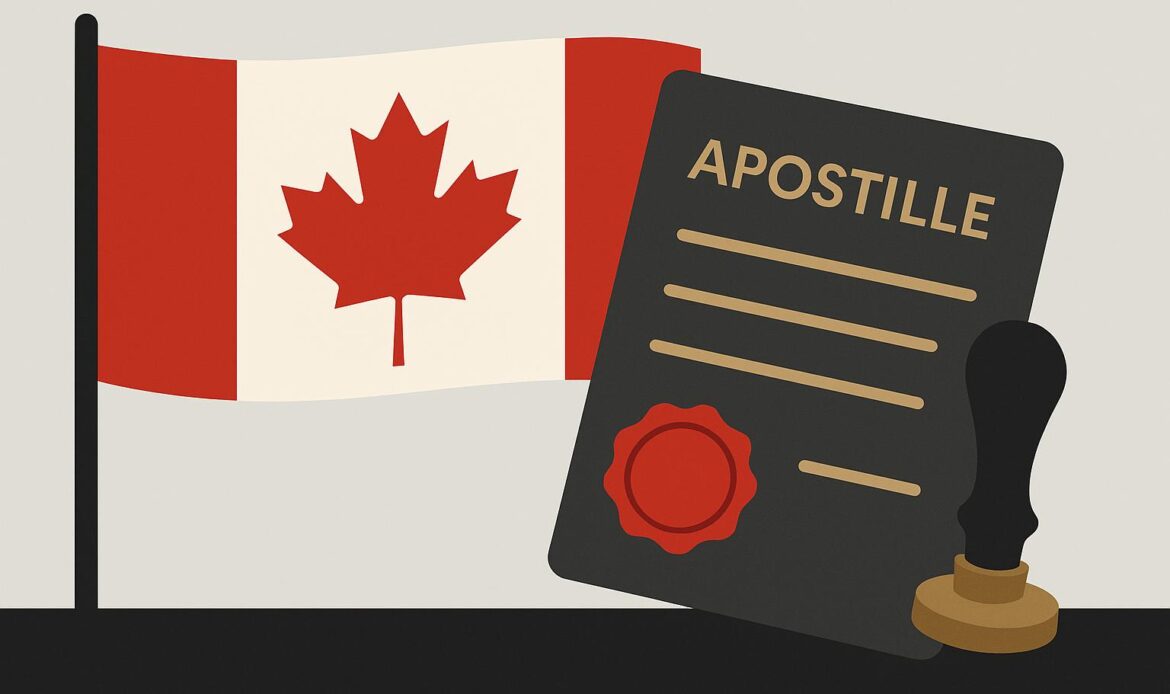Canada Apostille Convention: Canada's Accession
- Go Lawyers
Canada Joins Apostille
Canada has officially joined the Apostille Convention, a major step toward simplifying the process of legalising documents for international use. This change means that public documents issued in Canada, like birth certificates, legal contracts, and academic records, can now be more easily recognised in other member countries.
For Canadians dealing with cross-border legal, business, or personal matters, this brings greater convenience, reduced processing times, and lower costs.
The Apostille Convention replaces the old, complex system of multiple authentications with a single certificate called an apostille. With this system now in place, Canadian individuals, businesses, and legal professionals can handle international document verification with more confidence and ease.
This guide will help you understand what the Apostille Convention is, how Canada’s membership impacts you, and what steps are involved in getting your documents apostilled.
What is the Apostille Convention?
The Apostille Convention, established in 1961, simplifies the process of verifying documents for international use by introducing a standardized certificate recognized by all member countries.
Understanding the Apostille
An apostille is a certificate that authenticates the origin of a public document, making it valid for use in all member countries of the Apostille Convention.
Why Canada’s Accession is Important
Canada's joining of the Apostille Convention streamlines the legalization of Canadian documents for international use, reducing administrative burdens and facilitating cross-border transactions.

What is the Apostille Convention?
The Apostille Convention was established in 1961 to streamline the process of verifying documents for international use. Before the convention, documents had to be legalized through a complicated chain of certifications. The convention introduced a standardized certificate, the apostille, which is recognized by all member countries.
Understanding the Apostille
An apostille is a certificate that verifies the authenticity of the signature, the capacity in which the person signing the document has acted, and, where appropriate, the identity of the seal or stamp the document bears. It is an internationally recognized form of certification that simplifies the process of validating documents abroad. Before the Apostille Convention, documents had to go through multiple steps of authentication, often involving various government agencies and foreign embassies or consulates. This process was not only time-consuming but also costly. With the apostille, once a document is apostilled, it is recognized in all member countries, significantly reducing the time and effort required for international document legalization.
- let’s navigate your path forward together.
Need an Apostille for Canada? We’re Here to Help.
Get professional notary and certification support from our Parramatta-based team. Stay compliant with Canada’s Apostille Convention requirements and legalise your documents with confidence.
Why Canada’s Accession is Important
Simplification of Cross-Border Transactions
Canada’s accession to the Apostille Convention means that Canadian public documents intended for use in other member countries will now require fewer steps for legalization. This simplification is particularly beneficial for businesses and individuals engaged in cross-border activities, such as trade, education, and legal matters.
Boosting International Trade
For businesses, the ability to quickly and efficiently legalize documents can facilitate smoother operations and expand opportunities in international markets. The reduction in administrative burdens allows companies to focus more on their core activities rather than navigating complex legal processes.
Enhancing Legal Certainty
For legal practitioners and individuals, Canada’s accession provides greater legal certainty and predictability when dealing with international documents. Whether it involves property transactions, marriage certificates, or educational diplomas, the apostille ensures that Canadian documents are recognized and accepted in other member countries without further authentication.
The Process of Obtaining an Apostille in Canada
For individuals in Australia, especially those residing in Parramatta, seeking assistance with document notarisation for use in Canada, consulting a notary public Parramatta can ensure that documents meet the requirements before obtaining an apostille.
Steps for Document Authentication
With Canada now a part of the Apostille Convention, the process for obtaining an apostille involves a few straightforward steps:
- Document Preparation: Ensure that your document is an official public document, such as a birth certificate, court judgment, or notarial act.
- Submission to Competent Authority: Submit the document to the designated competent authority in Canada responsible for issuing apostilles. This authority will verify the document’s authenticity.
- Issuance of Apostille: Once verified, the competent authority will issue an apostille certificate, which can be attached to the original document or issued as a separate document.
Competent Authorities in Canada
In Canada, the competent authority responsible for issuing apostilles will typically be a government agency or office designated by the federal or provincial government. It is essential to check with the relevant authorities to understand the specific procedures and requirements for obtaining an apostille for your documents.
Impact on Canadian Citizens and Businesses
Businesses operating between Canada and Australia, particularly in metropolitan areas like Sydney, can benefit from streamlined document processes. Engaging a notary public Sydney can facilitate the preparation of documents requiring apostille certification.
Greater Mobility for Individuals
The Apostille Convention eases the process for Canadians who need their documents recognized abroad, such as students seeking education in other member countries or professionals pursuing work opportunities internationally. With an apostille, their credentials and documents are more readily accepted, enhancing their mobility and access to global opportunities.
Streamlined Business Operations
For Canadian businesses, especially those in sectors like manufacturing, technology, and services, the streamlined document legalization process can lead to more efficient operations and faster entry into foreign markets. The reduced bureaucratic hurdles enable businesses to establish international partnerships, secure contracts, and expand their global footprint more effectively.
Legal Practitioners’ Perspective
Legal professionals in Canada will benefit from the increased efficiency and predictability in handling international documents. The apostille provides a uniform standard that simplifies the preparation and processing of documents needed in foreign jurisdictions, enhancing the overall efficiency of legal services.
Challenges and Considerations
Transition Period
While Canada’s accession to the Apostille Convention brings numerous benefits, there may be a transition period as government agencies and businesses adapt to the new process. It is crucial for stakeholders to stay informed about the changes and updates related to the implementation of the apostille system in Canada.
Understanding Limitations
While the apostille simplifies the legalization process, it is important to note that it does not change the content of the document or its legal effect. It solely certifies the authenticity of the document’s signature or seal. Users must still ensure that the document meets the legal requirements of the destination country.
Conclusion
Canada’s accession to the Apostille Convention marks a pivotal development in international document legalization, offering significant advantages for individuals, businesses, and legal practitioners alike. By simplifying and standardizing the process, Canada enhances its global connectivity and opens new opportunities for its citizens and economy.
As the world becomes increasingly interconnected, the ability to efficiently authenticate documents for international use is more important than ever. With the apostille, Canada takes a step forward in facilitating international cooperation and fostering a more seamless global exchange of information and services.
- Expert Mediation Services
Find Resolution, Not Conflict
Disputes don’t have to lead to lengthy court battles. At Go Lawyers, our mediation lawyer services provide a practical and efficient way to resolve conflicts. Our experienced team fosters constructive dialogue to achieve fair and mutually beneficial outcomes, whether it's family mediation, business disputes, or transactional issues.
Let us guide you toward a solution that prioritises your interests while preserving relationships.
- Why Choose Go Lawyers?
Professional Lawyers who offer a fixed, fair price
Whether you are an individual, a business owner, or part of a giant corporation, our experienced team delivers solutions that protect your interests and drive results. From drafting contracts and negotiating agreements to resolving disputes through mediation or litigation, we handle every aspect of your legal needs professionally and carefully.
We understand the importance of clear communication and cost-effective services, so we prioritise transparency and efficiency. Our team possesses expertise in risk management, compliance, and the resolution of commercial disputes, allowing you to depend on us as a reliable partner throughout the entire process.
